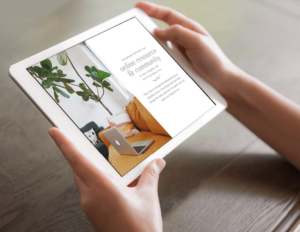Hi, my name is Allison Schaaf, my own fertility journey, including 5 miscarriages, inspired me to create this website to help YOU navigate your own fertility journey.
I have had one dilation and curettage (D&C) and 4 miscarriages where I miscarried naturally. I was happy with my decision with all 5 miscarriages. Because each miscarriage can look very different, I have learned to ask myself the following questions when deciding between a D&C vs miscarrying naturally.
Want a printer-friendly pdf version of this article? Sign up for our newsletter and receive free download to our top articles, including this one! Click HERE
1. Have I already started miscarrying?
Deciding between a D&C vs a natural miscarriage has many considerations. If I have already started my miscarriage, I just let it pass naturally. Depending on where you are at in the process of your miscarriage, miscarrying naturally may be the only option!
You can read more about my experiences with miscarriage at home here and here. My first miscarriage I did visit the urgent care and eventually the ER, you can read more about that here. I have also experienced one D&C, which you can read about here.
2. How far along is my pregnancy?
A miscarriage at 6 weeks will look and feel very different than a miscarriage at 12 weeks! The only D&C I had was when I miscarried at ~11 weeks. Keep in mind that an early miscarriage at 6 weeks will typically be similar to a heavy period with cramping. The further along you get in a pregnancy, the more likely a miscarriage can resemble labor with contractions and a more recognizable fetus.
According to the American Pregnancy Association, women can safely miscarry on their own up until 10 weeks, but a D&C may be recommended for women who miscarry later than 10-12 weeks1.
3. What is my doctor recommending?
Always take time to discuss with your doctor and hear their recommendations. Your doctor will know more about your unique situation and why one option may be preferable to another.
4. Am I experiencing any debilitating pregnancy symptoms?
You can continue to have extreme morning sickness (nausea & vomiting) even without a heartbeat. Making the decision to wait and see if you will miscarry naturally vs doing a D&C could mean extending these symptoms. Whereas with a D&C, once the surgery is over, any pregnancy symptoms should disappear pretty immediately.
5. What are the risks of D&C vs miscarrying naturally?
A D&C is a routine & safe procedure but does include risks of uterine perforation, infection and adhesions (these are rare)2.
With a natural miscarriage, there is a risk you may end up needing a D&C in the long run. After 10 weeks, a natural miscarriage is more likely to be incomplete, requiring a D&C3. There could also be emotional risks of unnecessarily prolonging the pregnancy.
6. Do I have any special circumstances that might lead to a D&C vs miscarrying on my own?
This is another question that should be considered with your doctor. Your situation my have special circumstances making one option preferable to another.
7. How might my decision on how to miscarry impact me emotionally?
Miscarriage can be traumatizing. It is important to think through any emotional impact that your decision might have. It is also important to recognize that when making the decisions in the moment, emotions are likely already high. Try finding a trusted confidant (spouse, friend, therapist, etc) that will listen as you talk through your decision of miscarrying naturally vs a D&C.
8. What does the recovery look like for a D&C vs miscarrying at home?
With a D&C, the recovery could include general recovery symptoms from anesthesia (nausea, vomiting, sore throat if a tube was placed to help you breathe and drowsiness). And up to a few days after, you may experience mild cramping. Spotting or bleeding can last up to 2 weeks. You will have to wait at least 1-2 days to resume normal activity and will also want to wait avoid infection by not using a tampon, avoiding sexual activity and not soaking in water (ie, a bathtub, hot tub or pool)4.
As mentioned previously, in rare circumstances, D&C can lead to serious complications including heavy bleeding, infection and uterine or bowel puncture.
With a natural miscarriage, the timing can be unpredictable. Recovery includes heavy bleeding and cramping and as with a D&C, you will likely be asked to avoid infection by not using a tampon, avoiding sexual activity and not soaking in water (ie, a bathtub, hot tub or pool). The process and recovery will vary, especially depending on what week of pregnancy you are in.
9. What fears do I have surrounding a D&C?
Explore any fears you have around a D&C. Talk through questions and concerns with your doctor. It might also be wise to consult with someone else who has experienced a D&C to hear more about their experience.
10. What fears do I have surrounding a natural miscarriage?
You will also want to discuss any fears and concerns you have a with a natural miscarriage. Remember that it may take time for a natural miscarriage to begin and this may have an emotional toll. Again, checking with a doctor and someone who has been through a natural miscarriage may help ease some of these fears & concerns.
Bonus Question: What feels right to me?
Throughout my fertility journey, I have found this question, “What feels right to me?”, is usually the most important one to ask! I recommend asking the questions above and getting the facts, but then check in with yourself and see what option feels best to you.
Considering Medical Management, too?
If you are also considering medical management of your miscarriage through the use of medications such as misoprostol/ cytotec, read this article for addditional considerations.
Successful Pregnancy is Possible After D&C or Natural Miscarriage
The good news is that the chances of getting pregnant after a D&C or natural miscarriage are high. While a D&C does include some risks, including risks to future pregnancies, these risks are typically low. You will want to work with your doctor to understand your specific risks of a D&C vs miscarrying at home.
Next Steps to Consider
- Sign up here and receive a FREE pdf copy of the questions asked in this article. When you sign up you’ll receive an email with a link our free lab checklist plus the pdf downloads for our most popular articles!
- Ask yourself the above 10 questions to help decide between a D&C vs a natural miscarriage
- Be sure to include your doctor in your decision-making process, especially since your situation may have unique circumstances not considered in the above questions
- Check in with someone who has had a similar experience; consider joining our Facebook Group to meet others dealing with miscarriage.
References




Thank you so very much for your incredibly detailed information and personal experiences! 🙏🏼 This has been helpful, exactly what I needed to find and read tonight. Your transparency and honesty is helping many Mothers through their dark times with miscarriage. You’ve given me hope also! You are a strong and radiant light. Thank you! 💜
Tomorrow will be one full week since my gradaughter had a miscarriage, the dr wouldn’t do anything, said for her to have it herself she wants to go ahead & get it over with so she can move on